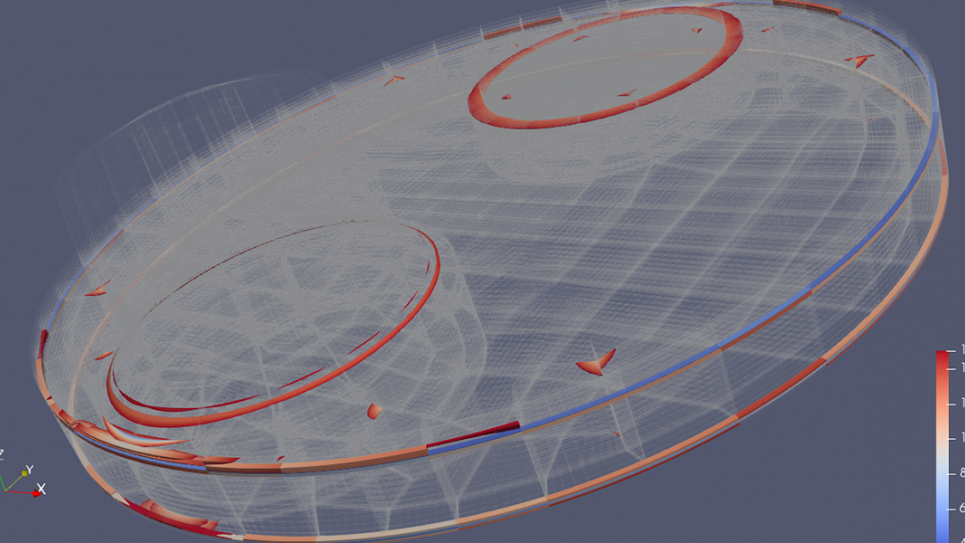The U.S. Department of Energy’s (DOE) ASCR Leadership Computing Challenge (ALCC) has awarded 12 projects a total of 5.9 million node-hours at the Argonne Leadership Computing Facility (ALCF), located at Argonne National Laboratory, to pursue challenging, high-risk, high-payoff simulations.
The Advanced Scientific Computing Program (ASCR), which manages some of the world’s most powerful supercomputing facilities, selects projects every year in areas directly related to the DOE mission for broadening the community of researchers capable of using leadership computing resources and serving national interests for the advancement of scientific discovery, technological innovation, and economic competitiveness.
The ALCC program allocates computational resources at ASCR’s supercomputing facilities to research scientists in industry, academia, and national laboratories. In addition to the ALCF, ASCR’s supercomputing facilities include the Oak Ridge Leadership Computing Facility (OLCF) at Oak Ridge National Laboratory and the National Energy Research Scientific Computing Center (NERSC) at Lawrence Berkeley National Laboratory. The ALCF, OLCF, and NERSC are DOE Office of Science User Facilities.
The 12 projects awarded time on the ALCF’s Theta supercomputer are noted below. Some projects received additional computing time at OLCF and/or NERSC (see the full list of awards here). The one-year awards began on July 1.
- Paulo E. Alves from SLAC National Accelerator Laboratory received 1,000,000 node-hours for “Particle Acceleration in Plasma Jets: From Astrophysics to the Laboratory.”
- Muhsin Ameen from Argonne National Laboratory received 630,000 node-hours for “Towards Exascale Internal Combustion Engine Simulation with In-Situ Analysis.”
- Aida El-Kahdra from the University of Illinois at Urbana-Champaign received 400,000 node-hours for “Semileptonic B- and D-Meson Form Factors with High Precision.”
- Katrin Heitmann from Argonne National Laboratory received 400,000 node-hours for “The Next Leap Forward in LSST Sky Simulations.”
- Aleksander Obabko from Argonne National Laboratory received 340,000 node-hours for “Nuclear Energy Industry Validation of Nek5000: ALAIN and HYMERES.”
- Saori Pastore from Washington University in St. Louis received 390,000 node-hours for “Low Energy Neutrino-Nucleus Interactions.”
- Igor Rakhno from Fermilab received 450,000 node-hours for “Neutrino Flux, Energy Deposition and Radiological Studies for the DUNE-LBNF Beamline.”
- Emily Shemon from Argonne National Laboratory received 880,000 node-hours for “High-Fidelity Physics Simulations for DOE and Industry Fast Spectrum Nuclear Reactor Systems.”
- Dongwon Shin from Oak Ridge National Laboratory received 350,000 node-hours for “Supercomputing for Automotive High-Temperature Alloy Design.”
- J. Ilja Siepmann from the University of Minnesota received 620,000 node-hours for “Predictive Modeling and Machine Learning for Functionally Nanoporous Materials.”
- Rajeev Surendran Assary from Argonne National Laboratory received 240,000 node-hours for “Accelerated Catalyst Discovery from First Principles Simulations and Machine Learning.”
- Brian Wirth from Oak Ridge National Laboratory received 200,000 node-hours for “Modeling the Response of Fusion Plasma Components.”
Argonne National Laboratory seeks solutions to pressing national problems in science and technology. The nation's first national laboratory, Argonne conducts leading-edge basic and applied scientific research in virtually every scientific discipline. Argonne researchers work closely with researchers from hundreds of companies, universities, and federal, state and municipal agencies to help them solve their specific problems, advance America's scientific leadership and prepare the nation for a better future. With employees from more than 60 nations, Argonne is managed by UChicago Argonne, LLC for the U.S. Department of Energy's Office of Science.
The U.S. Department of Energy's Office of Science is the single largest supporter of basic research in the physical sciences in the United States and is working to address some of the most pressing challenges of our time. For more information, visit https://energy.gov/science
